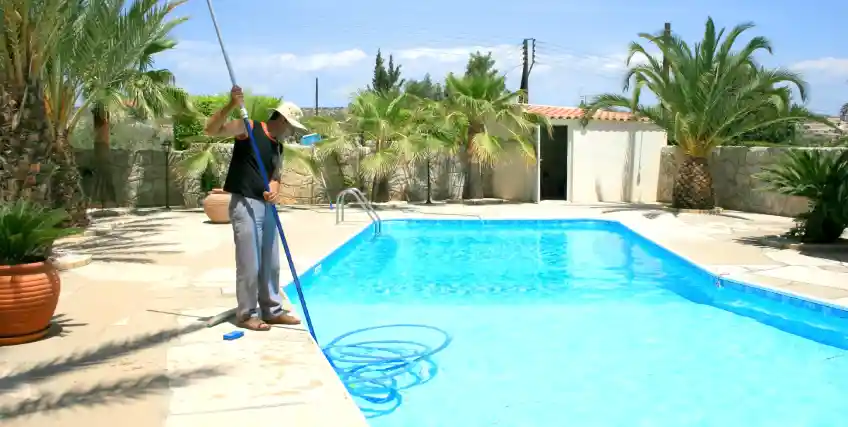Pool Equipment Financing: The Essential Guide for Pool Builders and Service Companies
Aug 28, 2025 | Last Updated on: Sep 01, 2025

Many pool service companies and pool builders eventually reach a point where growth depends on finding the right financing options. Clients want new pools, hot tubs, and upgrades like saltwater systems, automatic skimmers, and energy-efficient heaters, but the cost of purchasing high-quality pool equipment or fronting money for client orders can slow expansion. Excavation machinery, commercial pool pumps, robotic cleaners, and advanced water testing systems often carry price tags that are hard to pay upfront. Pool equipment financing gives business owners a structured way to borrow, manage monthly payments, and maintain cash flow while investing in long-term growth. Learn why pool equipment entrepreneurs borrow, the available financing options, and how to choose the right lender.
Why Borrowing for Equipment Makes Sense
The pool and spa industry requires ongoing investment. For pool builders, the ability to start an inground pool installation or a new pool upgrade quickly can be the difference between winning or losing a client. For service-focused companies, pool maintenance equipment like chlorine testers, vacuums, skimmers, and pool covers directly impacts customer satisfaction and the ability to retain service contracts.
The challenge is cost. Even smaller items, such as pool pumps, saltwater chlorinators, and hot tub lifts, can total thousands of dollars. Heavy-duty machinery or bulk equipment purchases for multiple pool installations can require tens of thousands or more. Financing allows businesses to break these costs into manageable monthly payments instead of making a large down payment that strains working capital.
Borrowing also enables companies to respond to seasonal demand. A pool service company that can add a second truck, purchase more pool supplies, and hire seasonal staff before summer often captures more clients. Pool equipment financing turns these opportunities into reality without forcing owners to empty their accounts or rely solely on credit cards.
Beyond seasonal needs, financing supports growth in a competitive market. Companies that can invest in new pool construction tools, hot tub installation equipment, or automated cleaning systems can differentiate themselves. Many pool owners want upgrades like saltwater systems, energy-efficient pumps, or advanced filtration. Borrowing to make these upgrades possible can win the contracts of clients who won't pay until the job is done.
Common Pool Equipment Financing Options
Several structured pool equipment financing options are available to pool service companies and pool builders:
Term Loans
A term loan provides a lump sum upfront with a fixed repayment schedule. This structure is ideal when a company wants to finance multiple items together, such as pool covers, pool pumps, heaters, and skimmers in one package.
For the life of your loan, the interest rate and monthly payment remain fixed, making it easier to budget. Interest rates vary based on the borrower’s credit score, revenue history, and overall financial profile. Term loans remain a core financing option for pool construction companies that want predictable costs for large investments.
Business Line of Credit
A business line of credit provides ongoing access to funds up to a certain limit. The interest rate is variable, but borrowers only pay interest on the amount drawn. As you pay down the balance, you free up available credit for future purchases. This flexibility makes it ideal for ongoing pool maintenance needs or incremental equipment purchases, such as pool supplies, chlorine, or replacement pumps.
Seasonal pool service companies benefit from the flexibility to borrow during peak months and repay when cash flow improves. Lines of credit are also helpful for covering unexpected costs, like repairing a broken hot tub crane or buying replacement pool covers mid-season. However, a line of credit typically isn’t the right pool equipment financing option for long-term borrowing.
SBA Loans
Small Business Administration (SBA) loans are popular for larger financing needs. They feature competitive interest rates, longer repayment terms, and partial government backing that makes lenders more willing to approve qualified borrowers for pool equipment financing. SBA 7(a) loans can be used for financing pool equipment, supporting new pool construction, or expanding your business, like adding hot tub installation services. SBA Express loans are ideal for smaller loans or new businesses. While the application process is more involved and requires a credit check and full financial documentation, the favorable terms can be worth the extra effort.
Equipment Financing Loans
Equipment loans are designed specifically for acquiring business equipment. The pool equipment itself, such as pumps, heaters, robotic vacuums, or excavation machines, serves as collateral. Lenders like these loans because collateral lowers risk, which often results in better interest rates and longer terms. Repayment periods typically range from three to seven years, with fixed monthly payments that simplify budgeting.
Businesses commonly use pool equipment financing for high-cost purchases, like in-ground pool excavation tools, large filtration systems, or advanced water testing equipment. Borrowers retain ownership at the end of the loan, creating a long-term business asset. This type of loan is ideal for companies focused on long-term growth and asset building.
Alternative Financing Options
Not all businesses can immediately qualify for traditional loans for pool equipment financing. For companies facing eligibility challenges or seeking quick funding, alternative financing fills the gap:
Home Equity Line of Credit (HELOC)
Homeowners running small pool service companies may use their home equity to secure a HELOC. These lines of credit typically offer lower interest rates than unsecured loans. The downside is the personal risk of losing your home if you cannot make the payments. For businesses that are stable but require flexible financing options for upgrades, HELOCs can serve as a bridge between personal and business credit.
Merchant Cash Advance (MCA)
A merchant cash advance (MCA) offers quick access to cash in exchange for a percentage of future sales. It is often approved without extensive credit checks, making it useful for urgent pool equipment purchases. The tradeoff is high cost and frequent repayment, which can squeeze cash flow. This is best used for very short-term funding needs, like covering pool installation materials when a client's payment is delayed.
Personal Loans
New businesses without an established business credit profile sometimes rely on personal loans for pool equipment financing. Approval depends on the owner’s credit score and income, rather than business financials. However, personal loans tend to have smaller loan amounts, which can be less than you need to buy more expensive equipment, tools, or supplies.
These loans can finance smaller purchases like above-ground pool pumps, skimmers, or portable hot tub equipment, but carry personal liability. They can also bridge the gap for pool maintenance startups that need a first set of professional tools until they qualify for a business term loan.
Invoice Factoring
Companies that perform pool installation or maintenance for commercial clients can sell unpaid invoices to a factoring company for immediate cash. These pool financing options are faster than many loans but reduce profit margins. Factoring works best when quick access to capital outweighs the long-term cost, such as when buying essential pool equipment to complete multiple inground pool projects.
Financing vs. Leasing
Pool companies often weigh the benefits of pool equipment financing against leasing. Leasing allows the business to use the equipment for a fixed term without ownership. This keeps upfront costs low and makes it easy to upgrade when technology changes, such as when new robotic cleaners, saltwater systems, or energy-efficient pool pumps become available on the market.
Financing, by contrast, builds ownership and adds to the company’s asset base. Monthly payments may be similar, but financing usually ends with full ownership, while leasing may require returning the equipment or paying a buyout. Companies planning to keep heavy-duty assets like excavation machinery, inground pool tools, or water testing labs for many years often prefer financing.
When deciding between leasing and financing, businesses should consider the equipment's lifespan, the cost of upgrades, and their long-term goals. Pool equipment that retains value and supports consistent revenue streams usually makes more sense to finance.
Considering Pool Equipment Financing and Vendor Programs
Vendors and distributors frequently provide their own pool equipment financing options. Pool pump financing, swimming pool financing packages, and bundled vendor programs can be highly convenient. Some include promotional interest rates, seasonal deferred payment options, or integrated service agreements. Vendor programs may also simplify the credit check and approval process, making them faster than traditional lenders.
Vendor financing is especially useful for pool maintenance contractors or small builders buying from suppliers they already trust. Bundled programs might also offer discounts on pool supplies, pool covers, and pool maintenance accessories. These savings can improve cash flow and reduce the overall cost of financing.
Comparing vendor options to bank or SBA loans helps businesses choose between speed, cost, and long-term flexibility. A vendor program may cost slightly more over time but allows a company to start new pool projects without delay.
Choosing the Right Lender or Vendor
Selecting the right pool equipment financing partner involves balancing multiple factors:
- Interest rates and fees: Even small differences in rates impact total cost over years of monthly payments.
- Eligibility and credit score requirements: Strong credit can reduce the interest rate and required down payment.
- Repayment flexibility: Seasonal payment options, interest-only periods, or balloon structures can benefit pool service companies with fluctuating income.
- Speed of funding: Businesses taking on new pool installation projects may need equipment immediately.
- Experience with swimming pool financing: Lenders familiar with pool construction, pool maintenance, and home improvement lending trends can offer terms that match real operational needs.
Peer recommendations, industry groups, and online reviews also help identify reliable financing partners.
Preparing for an Equipment Loan Application
Thorough preparation improves approval odds and may unlock better interest rates. Steps include:
- Gathering financial documentation: Tax returns, bank statements, business licenses, and detailed equipment quotes.
- Boosting credit score: Pay down credit cards, address errors on reports, and avoid new debt before applying.
- Calculating ROI and affordability: Estimate revenue from additional pool installation jobs, maintenance contracts, or hot tub upgrades to ensure the monthly payment is sustainable.
- Demonstrating growth potential: Lenders favor borrowers who can show that new equipment will increase revenue or efficiency.
Adding details like projected service expansion, demand for upgrades, or maintenance contracts can make the application more compelling.
The Bottom Line
Pool equipment financing provides a clear path for small businesses to expand without exhausting cash reserves. Whether financing pool pumps, skimmers, hot tub lifts, or heavy machinery for inground pool construction, borrowing strategically supports growth. By comparing financing options, preparing strong applications, and selecting reliable lenders or vendor programs, pool service companies and pool builders can secure the tools they need to thrive.
FAQs About Pool Equipment Financing
What is pool equipment financing and how does it work?
Pool equipment financing allows businesses to acquire pool equipment through loans or leases, breaking costs into monthly payments instead of paying upfront. The equipment often serves as collateral, which can lower rates and make it easier to qualify.
Can pool pump financing be included in larger pool equipment loans?
Pool pump financing is frequently combined with other equipment or even full pool construction projects to cover multiple upgrades at once.
What credit score is typically required for pool equipment financing?
Many lenders prefer a credit score of 650 or higher. Better credit improves eligibility, reduces interest rates, and may lower required down payments.
Are there pool equipment financing options suitable for seasonal businesses or pool maintenance contractors?
Seasonal payment plans, interest-only periods, and flexible repayment schedules are available to match the revenue cycles common in pool maintenance and installation businesses.
Is leasing pool equipment better than financing for long-term use?
Leasing works for short-term needs or rapidly changing technology. Financing is better for long-term assets, as it ends with ownership and potential tax benefits.
Frequent searches leading to this page
Term Loans are made by Itria Ventures LLC or Cross River Bank, Member FDIC. This is not a deposit product. California residents: Itria Ventures LLC is licensed by the Department of Financial Protection and Innovation. Loans are made or arranged pursuant to California Financing Law License # 60DBO-35839




